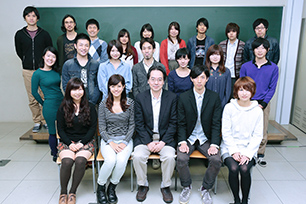Masatoshi Tamamura, Associate Professor, Faculty of Policy Management
The power to solve social issues through social marketing
Under the theme of social marketing and co-creation of values, 50 former graduates and 30 members including students, SAs, TAs, and faculty members teach and learn from each other in order to acquire the intellect and virtue to lead society.

The term “marketing”, which derives from “market + ing”, means to create a market—a place where values are co-created through various interactions and relationship-building, hence providing satisfaction to those involved—and to make that market function sustainably” (ing = present progressive form). Today, marketing is utilized not only in commercial enterprises but also in public and non-profit organizations and for local revitalization and social campaigns in order to fulfill their missions and accomplish their purposes in a more effective and efficient manner. Even in commercial enterprises, social effects of business activities such as corporate social responsibility (CSR) and social action programs have become important these days to support their sustainability, and ideas and techniques of marketing are used in such areas to enhance the outcome. This is called “social marketing”.
Yukichi Fukuzawa understood the term “society” as the concept of “associations between people.” He believed that society is formed through the various associations between people. From this standpoint, social marketing would mean to “create a market where people can associate with one another”. It is meant to allow associations to function more effectively, to solve social issues, and to realize an affluent society.
In my seminar class, we explore the nature of social marketing, go through a lot of literature, learn theories and concepts, and teach each other. As we do so, students work on their own research projects as well as on collaborative projects with corporations and practical projects implemented all over Japan, such as on Miyako-jima or in Fujiyoshida and Nagasaki. Although the class originally started under a theme that I envisioned, students gradually came up with their own rules and ways to proceed, ever conscious of the Keio spirit: hangaku hankyo [learning while teaching, teaching while learning], independence and self-respect, and being a constant source of honorable character and a paragon of intellect and morals. Each student pursues his/her “studies” (intellect) through jitsugaku or practical learning, and at the same time, thinks about the ideal situation of the seminar class, and through activities at the class, aims at acquiring “virtue” (mindset and behavior). Because they are Keio students who study social marketing, they seek to create a better market to associate with people at the seminar class.
Student's Voice
Kazue Yamawaki, Fourth-year Student, Faculty of Policy Management
A place of learning connected by the idea of “social”
Cause marketing, customer experience, CSR… These terms, typical of SFC, fly about the seminar classroom as we deepen our understanding of social marketing each day. Each student’s research field is wide-ranging, from food and agriculture to town development and design thinking. All students summarize their findings in a final paper to be published together with everyone else’s in a booklet. At the same time, each student reads one assigned piece of literature a week, and then teams up for thorough discussion and further research, and at the seminar class, we take turns teaching each other in teams. Aside from systematic studies, we also put weight on fieldwork, and during spring semester, we take practical approaches such as introducing the results of team research in magazines and catalogues. Our seminar class fosters strong connections between its members as we give each other feedback through Facebook and receive advice and the latest information from former graduates.
SA(Student Assistant): Undergraduate student support staff
TA(Teaching Assistant): Graduate student support staff
*This article appeared in the 2013 winter edition (No.277) of “Juku.”
*Position titles, etc., are those at the time of publishing.
